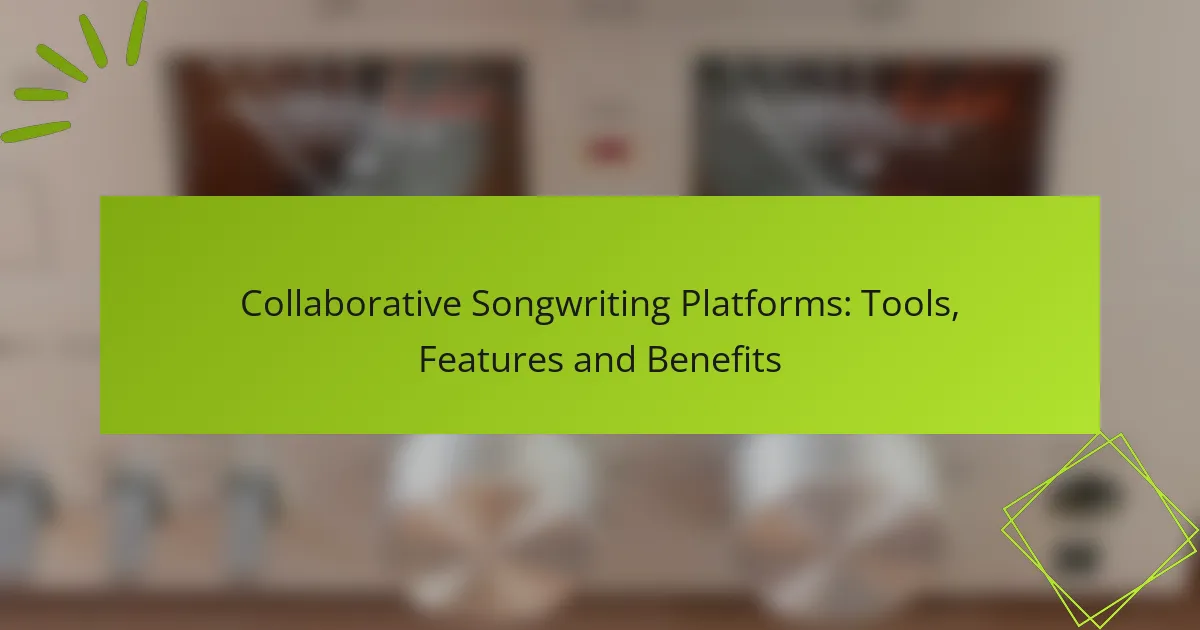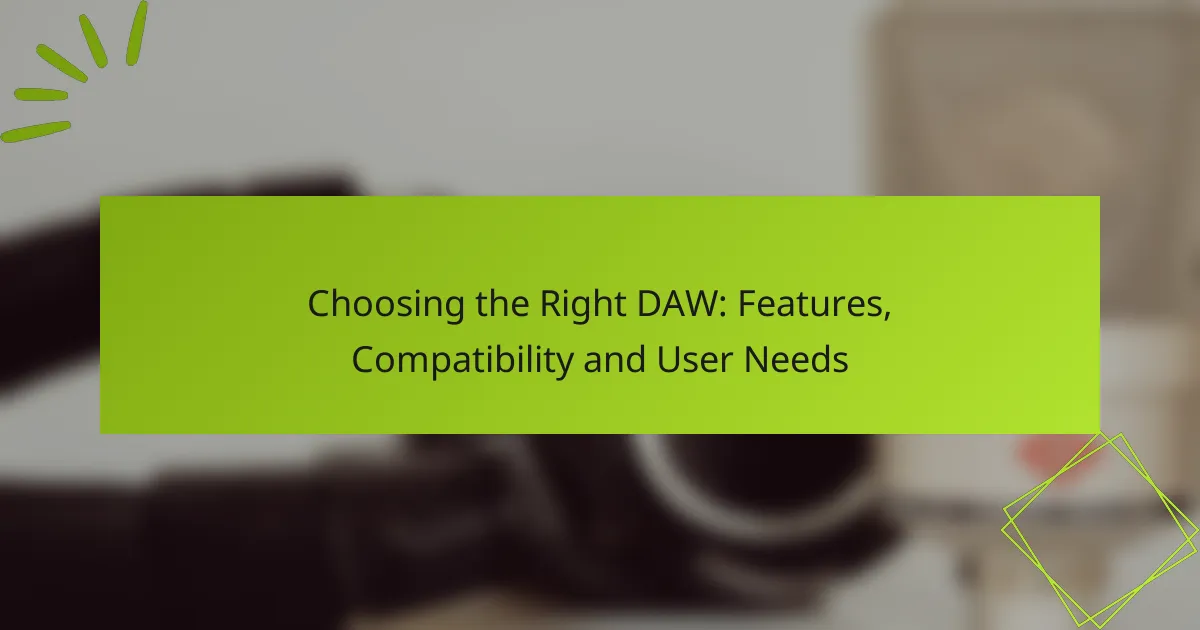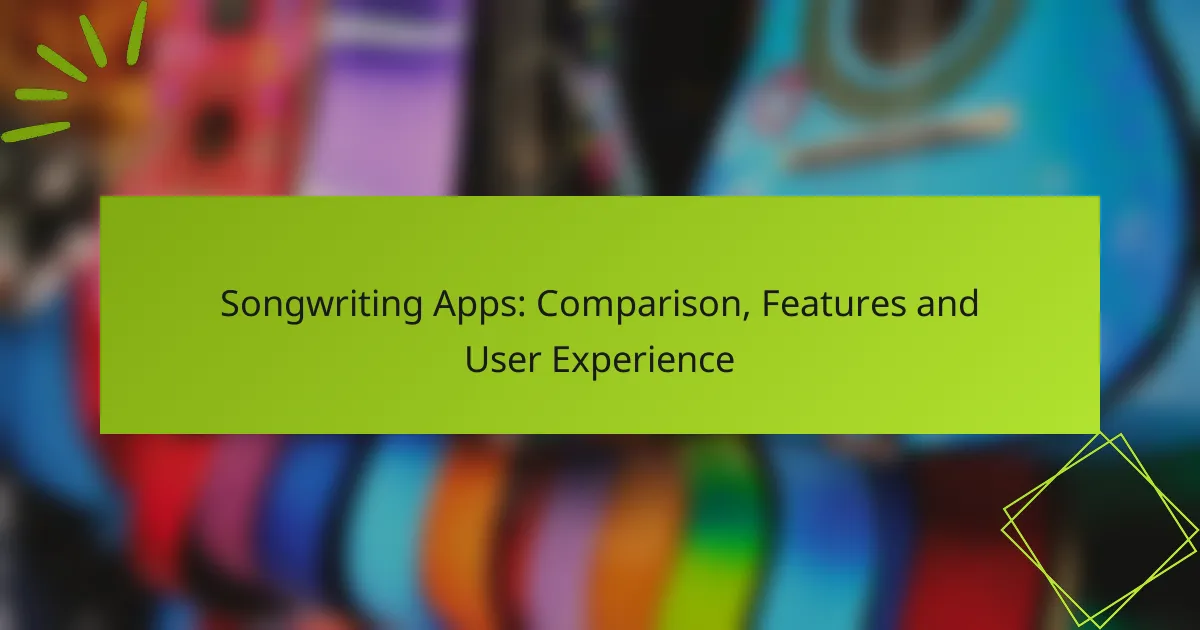Collaborative songwriting platforms offer musicians the ability to create and edit songs together in real-time, regardless of their locations. With features like audio recording, version control, and cloud storage, these tools enhance the creative process and streamline collaboration. By connecting artists from diverse backgrounds, they foster innovation and efficiency in music creation.
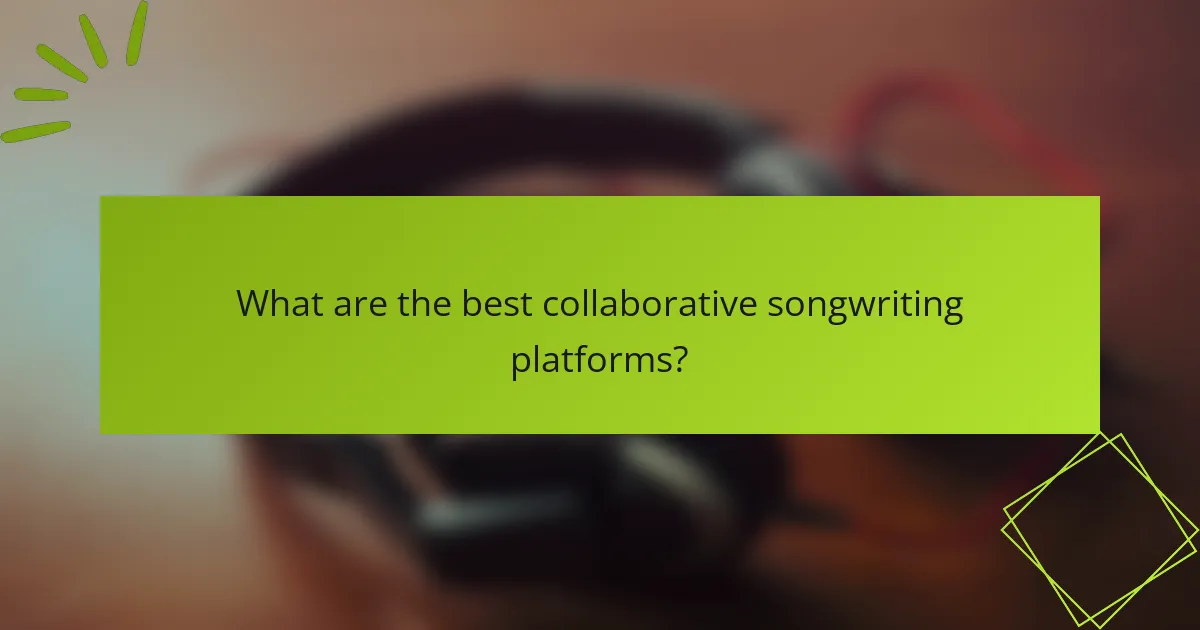
What are the best collaborative songwriting platforms?
The best collaborative songwriting platforms facilitate real-time collaboration, allowing musicians to create and edit songs together from different locations. These tools often include features like audio recording, editing, and sharing capabilities, making them ideal for songwriters looking to enhance their creative process.
Soundtrap
Soundtrap is a cloud-based platform that enables musicians to collaborate on music projects in real-time. Users can record vocals, add instruments, and utilize a variety of loops and effects, all while working simultaneously with others. The platform supports integration with other tools, making it versatile for different workflows.
One of Soundtrap’s key features is its user-friendly interface, which is accessible to both beginners and experienced musicians. It offers a free tier with basic functionalities, while premium plans provide additional features like advanced editing tools and more extensive sound libraries.
BandLab
BandLab is a free, web-based platform designed for music creation and collaboration. It allows users to record, edit, and share their music projects easily, with a strong focus on community engagement. Users can connect with other musicians, share their work, and receive feedback, fostering a collaborative environment.
With BandLab, you can access a variety of virtual instruments and effects, making it suitable for diverse genres. The platform also features a social media aspect, enabling users to follow each other and collaborate on projects, enhancing the overall songwriting experience.
Splice
Splice is known for its extensive library of samples and loops, which can be used in collaborative songwriting. It allows users to upload their projects and collaborate with others by sharing files and ideas seamlessly. The platform supports various DAWs, making it flexible for different music production styles.
Splice offers a subscription model that provides access to a vast collection of sounds, which can be a great resource for songwriters looking to experiment with new ideas. Its cloud storage feature ensures that your projects are safe and accessible from anywhere.
Noteflight
Noteflight is a web-based notation software that allows musicians to create, edit, and share sheet music collaboratively. It is particularly useful for songwriters who focus on composition and arrangement, as it provides a clear visual representation of musical scores.
The platform supports real-time collaboration, enabling multiple users to work on the same score simultaneously. Noteflight offers a free version with basic features, while premium subscriptions unlock advanced notation tools and additional sharing options.
Kompoz
Kompoz is a platform specifically designed for musicians to collaborate on original songs. It allows users to post their projects and invite others to contribute, making it easy to find collaborators with different skills and styles. The platform emphasizes building a community of songwriters and musicians.
Users can upload their audio tracks, share ideas, and receive feedback from fellow musicians. Kompoz operates on a free model, but offers premium features for enhanced collaboration and project management, making it a good choice for serious songwriters looking to expand their network.
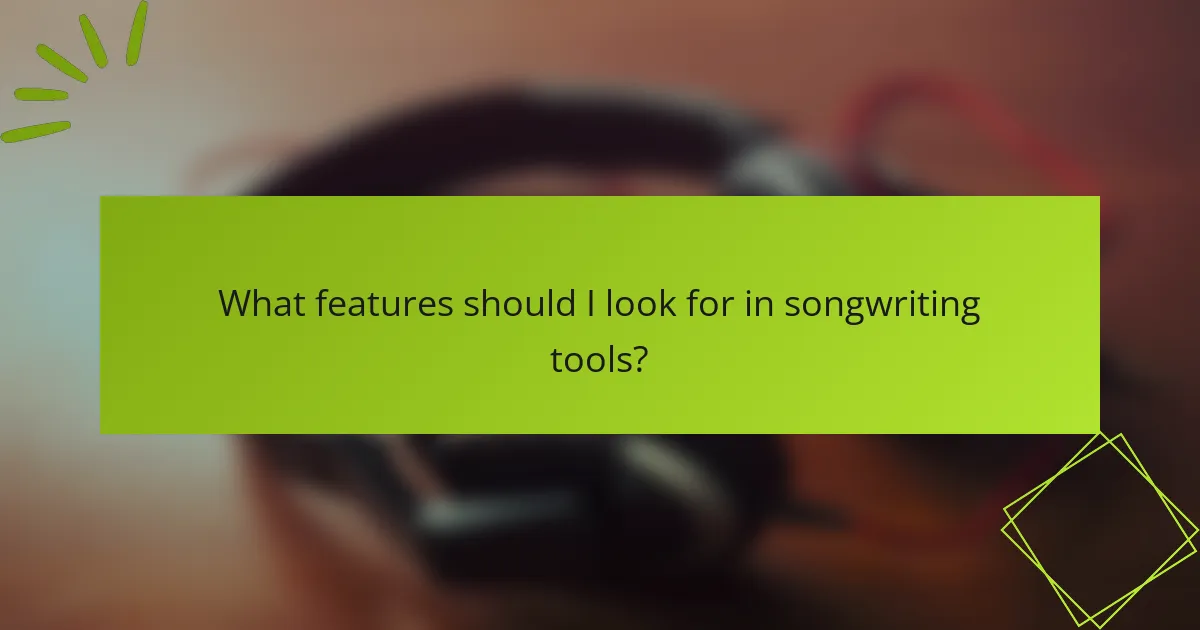
What features should I look for in songwriting tools?
When selecting songwriting tools, prioritize features that enhance collaboration, streamline editing, and ensure your work is securely stored. Key functionalities include real-time collaboration, version control, integrated audio editing, and cloud storage, all of which can significantly improve the songwriting process.
Real-time collaboration
Real-time collaboration allows multiple songwriters to work on a project simultaneously, facilitating immediate feedback and idea sharing. This feature is essential for teams spread across different locations, enabling seamless communication and creativity. Look for tools that offer chat functions or comment sections to enhance interaction during the writing process.
Examples of popular platforms with real-time collaboration include Soundtrap and BandLab, which allow users to see changes as they happen. This can lead to a more dynamic and engaging songwriting experience, as ideas can be built upon instantly.
Version control
Version control is crucial for tracking changes and managing different iterations of a song. This feature enables songwriters to revert to previous versions if needed, ensuring that no valuable ideas are lost. When choosing a tool, check if it automatically saves versions or allows users to manually create snapshots of their work.
Platforms like Google Docs and Notion provide robust version control, making it easy to see the history of edits and who made them. This transparency can help prevent conflicts and maintain a clear creative direction.
Integrated audio editing
Integrated audio editing features allow users to record, mix, and edit audio tracks within the same platform used for songwriting. This can save time and streamline the process, as songwriters can experiment with melodies and harmonies without switching between different software. Look for tools that support various audio formats and offer basic editing capabilities.
Tools such as Soundtrap and GarageBand provide built-in audio editing functionalities, enabling users to layer tracks and apply effects directly. This integration can enhance the overall workflow and make it easier to bring ideas to life.
Cloud storage
Cloud storage ensures that your songwriting projects are securely saved and accessible from anywhere with an internet connection. This feature is particularly important for collaborative efforts, as it allows all team members to access the latest version of a song without the risk of losing files. Choose tools that offer reliable cloud storage solutions with sufficient space for your needs.
Many songwriting platforms, like BandLab and Splice, provide cloud storage as part of their service, often with options for additional space if required. This can alleviate concerns about data loss and facilitate easier sharing among collaborators.
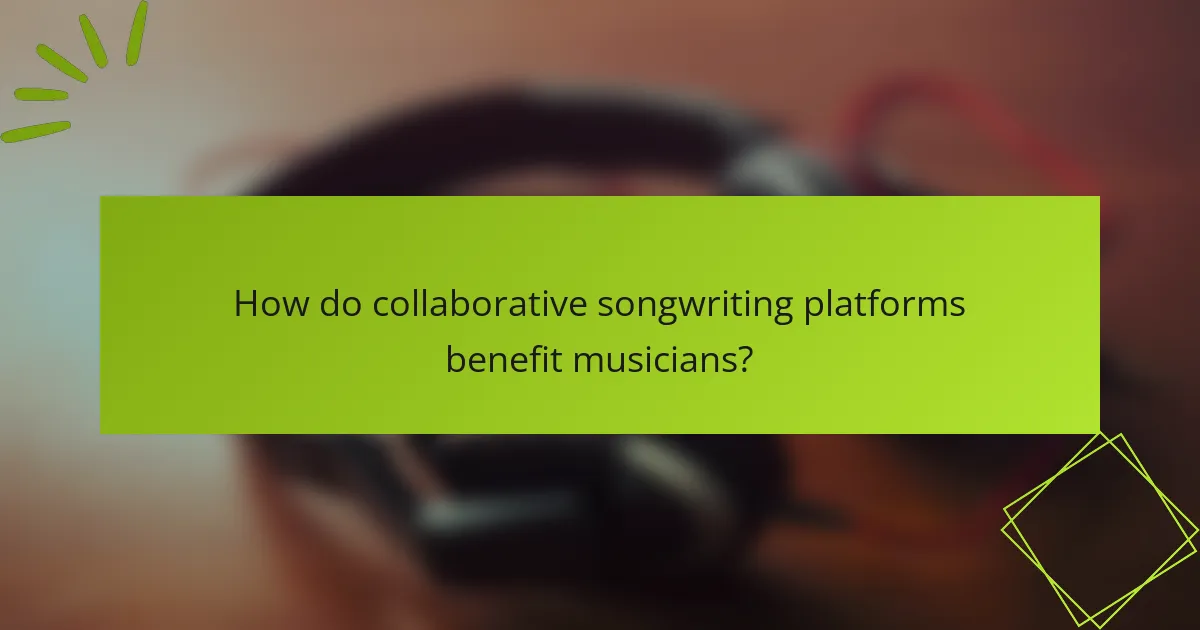
How do collaborative songwriting platforms benefit musicians?
Collaborative songwriting platforms provide musicians with tools that enhance creativity, facilitate skill sharing, and streamline the songwriting process. By connecting artists from various backgrounds, these platforms foster innovation and efficiency in music creation.
Enhanced creativity
Collaborative songwriting platforms encourage musicians to brainstorm and build upon each other’s ideas, leading to more innovative compositions. When artists share their perspectives, they can explore different genres and styles, resulting in unique musical pieces that may not have emerged in isolation.
Using features like real-time editing and feedback, musicians can experiment with melodies, lyrics, and arrangements together. This interactive environment often leads to breakthroughs in creativity, as artists feel inspired by their peers’ contributions.
Access to diverse skills
These platforms connect musicians with a wide range of skills, from lyricists to producers, enabling them to create more polished and professional work. For example, a songwriter might collaborate with a skilled guitarist or a seasoned producer, enhancing the overall quality of the music.
By leveraging the strengths of different collaborators, musicians can fill gaps in their own skill sets. This access to diverse expertise can lead to a more comprehensive understanding of music production and songwriting techniques.
Streamlined workflow
Collaborative songwriting platforms often include tools that simplify the songwriting process, such as task management features and version control. These tools help musicians keep track of changes and contributions, ensuring that everyone is on the same page.
Additionally, many platforms allow for asynchronous collaboration, meaning that musicians can work together regardless of time zone differences. This flexibility can significantly speed up the songwriting process, allowing artists to focus on creativity rather than logistics.
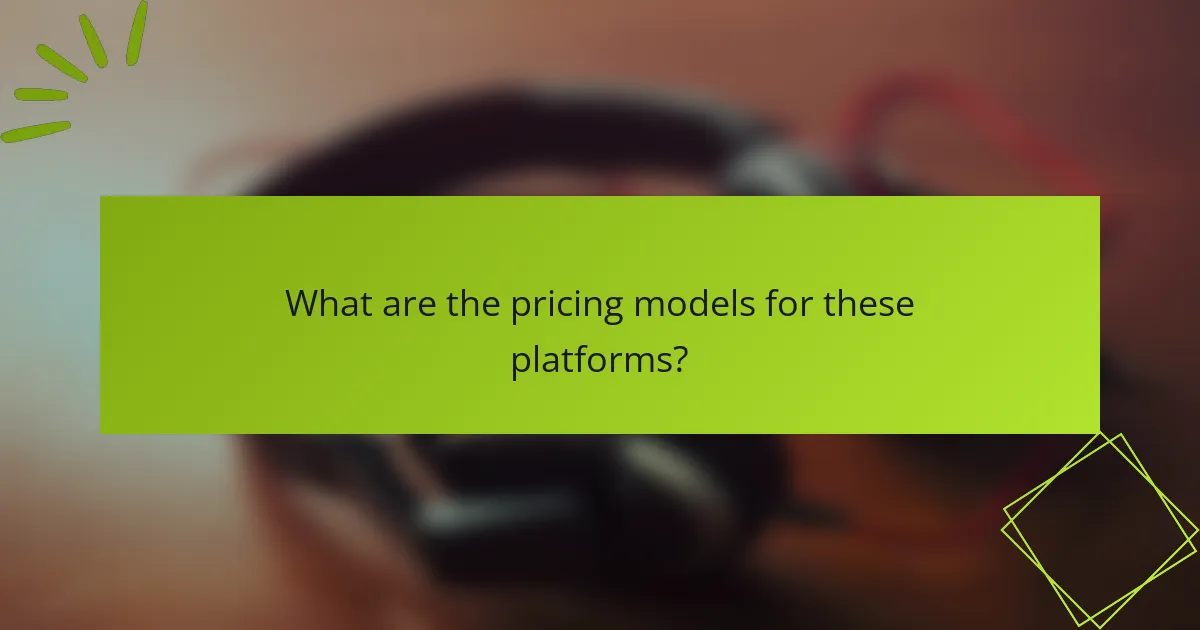
What are the pricing models for these platforms?
Collaborative songwriting platforms typically offer a variety of pricing models to accommodate different user needs. These models include free tiers, subscription plans, and one-time purchases, each with distinct features and limitations.
Free tier options
Many collaborative songwriting platforms provide free tier options that allow users to access basic features without any cost. These free versions often include limited storage, a restricted number of collaborators, and basic editing tools.
For example, platforms like Soundtrap and BandLab offer free accounts that enable users to create and share songs, but may limit the number of projects or the length of audio tracks. This is a great way for beginners to explore songwriting without financial commitment.
Subscription plans
Subscription plans are common among collaborative songwriting platforms, offering enhanced features for a monthly or annual fee. These plans typically include unlimited projects, advanced editing tools, and additional storage space.
Prices for subscription plans can range from around $5 to $20 per month, depending on the platform and the features included. For instance, platforms like Splice and Soundtrap provide tiered subscriptions that cater to different levels of users, from hobbyists to professional musicians.
One-time purchases
Some platforms offer one-time purchase options for specific features or tools, allowing users to pay upfront without ongoing fees. This model is less common but can be appealing for those who prefer not to commit to a subscription.
For example, certain software may allow users to buy additional sound packs or premium features for a flat rate, typically ranging from $10 to $100. This can be a cost-effective choice for users who want specific enhancements without a recurring payment.
